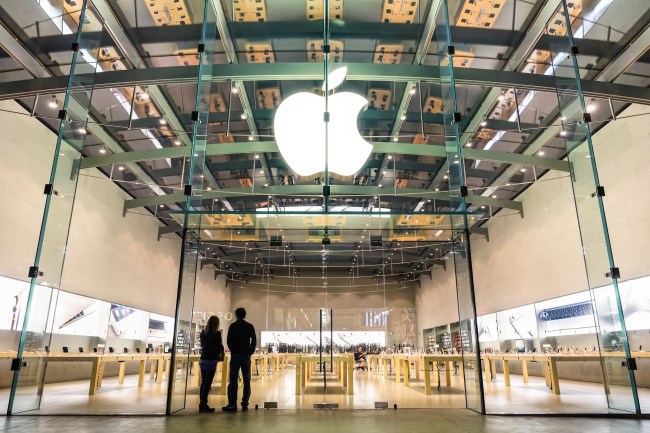
The Water Coolest is a free daily business news and professional advice email newsletter created for weekday warriors that is delivered fresh daily at 6 AM EST. Signup here to receive The Water Coolest every weekday.
THE HEADLINES
IVE GOT NEWS FOR YOU …

iStockphoto
Jony Ive is leaving his position within Apple after more than two decades. Ive, the mastermind behind the design of the iMac, iPod, iPhone, and Apple Watch, is leaving the mothership to start his own design company called LoveFirm, with Apple as its first client.
Quite the resume
Ive had been head of Apple’s design since 1996, a time when the future of the company was uncertain. His impact on pretty much every major product Apple has released not only turned the company around, but got him knighted by the Queen (of England, not Latifah) in 2012.
In 2015, Ive set his sights on designing Apple’s Cupertino campus, before resuming his role back on the tech side in 2017. The result? Apple’s “Spaceship” campus. And yet my neighbor took 6 years to finish building his deck.
Next in line?
No immediate successor has been tapped as chief design officer, but rumor has it, for now, Apple will be splitting the position into separate industrial and human interface design roles, headed by Evans Hankey and Alan Dye, respectively.
Ive will be bringing Apple colleague Marc Newson with him on his new venture. With news of Ive’s departure, Apple stocks dropped 1.74% in after-hours trading.
PASS/FAIL
*Double checks Feds announcement to confirm that Wells Fargo and Deutsche Bank actually passed the Fed’s stress test*
It’s good to be a bank shareholder right about now. Eighteen of the largest banks in the US passed the Fed’s stress tests, only the second time in nine years that everyone has passed, thus paving the way for larger shareholder payouts in the form of dividends and stock buybacks.
Following the 2009 financial crisis, the Dodd-Frank legislation sought to ensure that another sh*tstorm of epic proportions wouldn’t bring the economy to its knees. Among other controls meant to make Wall Street less fun than a back office job at Nomura, “stress tests” were introduced.
Large financial institutions face two tests annually, one which gauges how banks would fare if the economic equivalent of a sharknado hit and the second which measures resilience under the same scenario with one major difference: increased shareholder dividends and buybacks. The second and arguably more important test helps decide how much banks can pay out to shareholders.
Teacher’s pet
For the first time, the Fed will allow US banks to pay shareholders an amount higher than their respective profits because apparently, banks are healthy AF. Of course, all of the passing grades could have to do with the Fed making the test easier to pass earlier this year or the fact that this isn’t the banks’ first rodeo. Or, they could have gone full Aunt Becky.
There’s one in every crowd
But what would the Class of 2019 be without a class clown? Although it won’t be riding the short bus to school, Credit Suisse came up a bit short in its stress test (note: it didn’t “fail”), officially getting slapped with a “conditional non-objection.” This means the bank will have to fix issues the Fed found in its capital planning processes by the end of October.
The good news? Goldman Sachs and Morgan Stanley were handed the same designation last year … so there’s that.
IT WHICH MUST NOT BE DOWNLOADED
The highly anticipated augmented reality mobile game, Harry Potter: Wizards Unite has only managed to command 4.7M Muggle downloads in its first 6 days of existence. Maybe its core demo is waiting in line at Star Wars: Galaxy’s Edge or seeing Avengers: End Game for like the eighth time?
Over the same period, Pokémon Go, which was also created by Niantic, was downloaded 32M times. That’s a literal f*ck ton more for those keeping track at home. Worse yet, the game hasn’t even cracked the top 20 in major app stores, meaning the “hottest game of the summer” has been bested by the McDonald’s app.
But wait, there’s more!
In-app purchases also failed to match Pokemon Go’s success. HP has brought in just $1.9M over its (almost) week in existence, whereas Pokemon Go had a $50M haul over the same period.
Survey says
Reviews of the game have been mixed at best. Player’s have complained about a confusing concept that has almost nothing to do with the Harry Potter books or movies: locating “foundables” (which sound an awful lot like Pokémon if I do say so myself).
Not to mention there have been complaints of aggressive in-game monetization tactics. No Hagrid, I don’t want to pet your baby dragon for 3 Sickles.
IN OTHER NEWS

iStockphoto
- What goes up must come down. So is the case with bitcoin. Bitcoin was valued at nearly $14k on Wednesday, only to come tumbling back down to as low as $10.4k yesterday. At the time of writing, the decentralized currency, which can’t be used to buy literally anything, hovered around $11.5k.
- Raindrop, One drop, a blood glucose monitor in my App Watch. Apple is expanding further into the healthcare space, as some Apple stores have started selling One Drop, a blood glucose monitor that integrates directly into the health app. This health initiative will apparently be Apple’s ‘greatest contribution to mankind’ according to Tim Cook … well, besides the AirPower wireless charger (too soon?).
- The first three months of 2k19 saw the American economy grow 3.1%, but as we all know, good things don’t last forever. The current quarter has seen a drop off to around 2%, and much of the same can be expected for the rest of the year due in large part to decreased consumer confidence from trade tensions and slower global economic growth.
- Turns out the US isn’t the only country where automobile plants close and people with names like Hank fall on hard times. Ford has decided to close six factories in Europe, thus decreasing its European workforce by roughly 12k (or 20%). This cost-cutting effort comes at a time when the continent is seen as an unfavorable region for car sales, as it is dealing with slowing consumer growth, strict emission regulations (thanks VW!), and high labor costs.
Ready to become the most well-informed bro in any room? You can subscribe here.